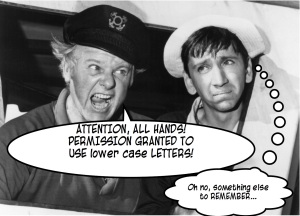Don’t you find it slightly irritating when people intentionally mispronounce words? Sometimes it isn’t merely a silly affectation. What bothers me are cases where people consciously reject the accurate version and flaunt their personal (inaccurate) alternative. It comes across to me like they are magnifying their ignorance with a sizeable dose of obnoxious stubbornness.
Anyone, of course, can accidentally mispronounce a word. Well, anyone aside from C.S. Lewis and J.R.R. Tolkien, that is.
I don’t enjoy (but don’t object to) simple silliness. In a 1932 American Speech article entitled “Intentional Mispronunciations,” the author says, “the custom is an old one, and in our age of light-hearted youth it is unusually widespread.” She immediately notes one danger.
The use of mispronunciations sometimes becomes habit, and it is often difficult to speak correctly when one is in sophisticated company.
The humble person, when advised on the proper enunciation of a particular word, thanks their friend (only friends should dare to sensitively point out such a slip). After expressing that appreciation, they go forward with the commitment to being a bastion of proper usage of the word in question.
However, there are those obstinate ignoramuses (OIs) who defiantly insist on perpetuating their sins.
Let us consider a common error. One that is quite easily corrected, unless the OI insists on actively rejecting knowledge. The word is “nuclear,” and you already know what the all too common mistake is. How can anyone, much less a graduate of Yale, entrusted with the Gold Codes, accompanied at all times by a military aide ready to hand them the “nuclear football,” continue to use the non-word nu-cu-lar? I have no idea how common this atrocity is outside the United States, but here in the States, it is far from rare.
A good friend of mine, who does public speaking, insists on pronouncing “recognize” without its “g.” I understand he must have learned it that way, but I will never get used to a person with advanced degrees saying “rec-a-nize.” My father was a curmudgeon, and this conscious affront reinforced his chosen image. He loved to push my buttons by adding an “r” to the state I call home. Warshington doesn’t exist on any map, but it certainly did in his mind.
Why Pronunciations Err
People are prone to mispronunciation when they’ve only read a word, and never heard it pronounced before. This was especially perilous before the existence of online dictionaries.
There is another hazard which can mislead someone in pronouncing a word incorrectly—and it was to this that I succumbed my first year at seminary. This is the case where a word is spelled in a manner that makes the errant pronunciation possible, and you have only heard it pronounced in the wrong way. This is the story of my shame.
I was taking a consortium course on ministry and media, which was taught by professors from four or five different seminaries. In my first “radio” presentation, I cited a passage from one of the Psalms. Everyone said it was well done—until the Roman Catholic professor (with nary a hint of affirmation) declared, ex cathedra: “it’s ‘sahm;’ you don’t pronounce the ‘l.’”
I was so embarrassed that I remained silent and soon as I got home I pulled out my dictionary, and darned if he wasn’t right. I have pronounced it correctly ever since, even in the face of a world that now considers me to be wrong.
My aversion to the intentional-mispronunciators does not extend to people who say “salm.” After all, that’s how the word should be pronounced.* But those people who insist on saying “re-la-ter” when the profession is clearly spelled “re-al-tor,” are begging for some sort of aversion therapy.
There is one additional case I wish to note here. That is when there are two (or more?) legitimate ways to pronounce a word. I’m not referring to homographs, like wind (wĭnd) and wind (wīnd).
C.S. Lewis also discusses pronunciation at great length in his essay “The Alliterative Metre,” where he notes,
In modern English many words, chiefly monosyllables, which end in a single consonant are pronounced differently according to their position in the sentence. If they come at the end of a sentence or other speech-group—that is, if there is a pause after them—the final consonant is so dwelled upon that the syllable becomes long.
If the reader listens carefully he will find that the syllable man is short in ‘Manifold and great mercies’ or ‘The man of property,’ but long in ‘The Invisible Man’ or ‘The Descent of Man.’
Words with multiple formally accepted pronunciations are fair game—as long as a person’s choice is from the list. Here’s one where pronouncing the “l” is optional: almond. Apricot can begin with either the sound “app” or “ape.”
A Playful Game Using Homographs
The following example uses a name, but the principle would be the same for any word with more than one authentic pronunciation. It comes from a book I read many years ago, which has retained a fond place in my memory. Robert McAfee Brown (1920-2001) was a Presbyterian theologian. The title of the volume suggests its satirical bent: The Collect’d Writings of St. Hereticus.
One of the appendices in the book is called “Theological Gamesmanship.” One of the games he features is “How to Win a Theological Discussion Without Knowing Anything.” The following gambit is called “Help from St. Augustine.”
A quiet yet forceful way of demonstrating superiority when Augustine is under discussion is to pronounce his name in contrary fashion to the pronunciation of the Opponent.⁑ Make a point of emphasizing the contrast, so that it will be apparent that you know you are right, and not even for politeness’ sake will you pronounce the name incorrectly as Opponent is doing. Either,
Opponent: . . . leading ideas in Augustine (Ogg-us-teen).
Self: Augustine (uh-Gust’n)may have said that on one or two occasions, but . . .
Or,
Opponent (usually an Anglican in this case): . . . leading ideas in Augustine.
Self: Augustine may have said that on one or two occasions, but the whole Augustinian tradition, following, as I believe, the essential Augustine himself . . .In this second gambit, it is advisable to maneuver the conversation into a discussion of “the Augustinian tradition” as indicated, so that when Opponent refers to it, as he must, without pronouncing it “the Augustinian tradition,” you can smile deprecatingly, to indicate that your point has been made.
[Brown adds a footnote that reads:] With sensitive Anglicans, it will often be enough simply to raise, ever so slightly, (a) both eyebrows, and (b) the second, third, and fourth fingers of the left hand.
Naturally, I’m not seriously suggesting that one-upmanship is something in which one should engage. On the contrary, Brown (and I) are holding up this sort of petty behavior as beneath the dignity of good people.
I’m sure that some would argue that correcting someone’s pronunciation in even the most glaring examples of verbal atrocities, constitutes bad manners. I, however, appreciate being privately corrected, so that I might not continue making the same mistake. Thus, I consider it the act of a friend.
C.S. Lewis was a patient and gracious man. He was quite tolerant of variation in pronunciation, even when it came to his own creations. In 1952 he responded to a correspondent inquiring how to properly pronounce the name of Aslan. I would guess the most common American version would be “æzˌlæn” opting to pronounce the “s” as a “z.” Here is Lewis’ response:
It is a pleasure to answer your question. I found the name in the notes to Lane’s Arabian Nights: it is the Turkish for Lion. I pronounce it Ass-lan [æsˌlæn] myself. And of course I meant the Lion of Judah. I am so glad you liked the book.
I loved the book, and I affirm its readers, whichever way they pronounce the name of the Great Lion. Well, as long as they don’t intentionally mispronounce it, including an invisible “r.” After all, there is most certainly no beloved image of Christ named Arslan!
* This waiver does not extend, however, to what may be the most common biblical mistake. The Book of Revelation does not have an “s.” Yet, how often do you hear it cited as Revelations?
⁑ This brazen technique is equally effective, no matter which pronunciation the person you seek to upstage has used.
The cartoon at the top of this post is used with the permission of xkcd.












